Sunday 21 February 2010
by: Pam Rasmussen, t r u t h o u t | Op-Ed
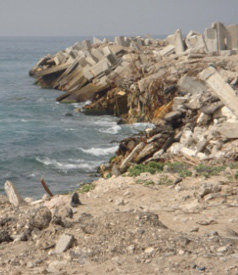
(Photos: Pam Rasmussen)
Once upon a time, this little strip of land (just 139 square miles, about twice the size of Washington, DC) was a potentially booming resort and fishing capital, with 25 miles of beautiful coastline and beaches and a Mediterranean seaport teeming with sardines and shrimp.
This is the Gaza Strip. But it's not a fairy tale and there is no happy ending. However, there are plenty of heroes and villains.
Ten years ago, Gaza's approximately 3,600 fishermen were hauling out approximately 3,000 tons of fresh fish a year, supporting an even larger 30,000 people in Gaza. Since then, violent clashes with - and ever-tightening restrictions by - the Israeli army have virtually destroyed the once-booming business. Today, just 20 percent of Gaza fishermen are still able to make a living in the industry most of them grew up with, and their total catch is three to five percent of what it used to be. And those who stick it out are putting their lives on the line.
Two days ago, says Mazen Hassan Abu Ryale, his cousin set out to fish in the port and came under Israeli fire. His boat was sunk and he was taken into custody. He hasn't been seen since. Today, Abu Ryale and his brother, Mooneer, tried to go out themselves. Less than three miles out, they also were attacked. They escaped with their lives and their boat, but three of their costly nets were confiscated and the rest were damaged. They managed to catch only six fish at a loss for the day of $800 (including the cost of fuel and replacing their nets)
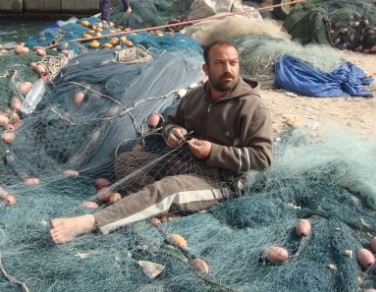
"I am 59 now and I have been fishing since I was three years old, with my father," says Mazen. "But now, I can barely make a living."
The "Interim Arrangements" signed between the Palestine Liberation Organization and Israel in 1994/1995, after the Oslo Accords were approved, stipulate that Gazan fishermen have the legal right to fish up to 20 nautical miles from the Gaza coastline. However, Israel never honored the Interim Agreements. According to Mohammed Hessey, general secretary of Gaza's Fishing Workers Trade Union, established in 1998, Israel waited just four years before unilaterally reducing the officially allowed fishing zone to 10 miles from shore. Then, when resistance fighters kidnapped Israeli soldier Gilad Shalit in 2006, the approved fishing zone was ratcheted down to six miles. Following Israel's latest attack on Gaza in December 2008 and January 2009, it was reduced once again to three miles. But even that zone isn't always honored. Israeli gun boats have been known to attack Gaza fishermen just one or two miles from the shore. Their weapons of choice are live ammunition and water cannons - which soldiers use to specifically target boats' structural components, particularly breakables like glass and machinery, or to hit passengers with a foul, sewage-smelling liquid.
In 2009, one fisherman was killed by the Israeli navy, 20 fishermen and civilians were wounded while on the water or shore, 68 were abducted and 29 boats were confiscated. Each boat confiscated represents a financial loss of $50,000-$200,000. For a while, it helped to have international volunteers on board the boats, from organizations like the Free Gaza Movement and the International Solidarity Movement. The presence of non-Palestinians, says Hessey, deterred the Israelis enough to allow them to fish up to six miles out from the coast. The last international volunteers to officially do so went out to sea on November 18, 2008, when three trawlers were confiscated and 15 fishermen and three ISM activists (Andrew Muncie, 34, from Scotland; Darlene Wallach, 57, from the United States, and Vittorio [Victor] Arrigoni, 33, from Italy) were abducted while fishing at about seven miles offshore. The 15 fishermen were later released and the three ISM volunteers were deported. The three trawlers were only returned after three human rights organizations - the Al-Mezan Center for Human Rights, the Palestinian Centre for Human Rights (PCHR) and the ISM - filed a legal appeal against Israeli Defense Minister Ehud Barak and the commander of the Israeli Navy.
Since then, the fishermen have considered it too dangerous to go out with internationals - both for the volunteers and for themselves. (The soldiers who seized the 18 fishermen and internationals in November threatened: "You think that you have protection because you have internationals on your boat? Let's see what these internationals can do for you now.")
"Now, we have to stay so close to the shore that we must settle for catching only the smallest of fish ... the ones we would have thrown away before, and that would be illegal in other countries," says
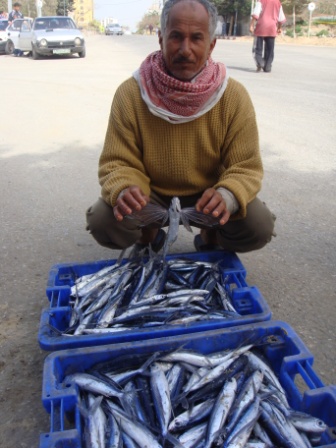
This desperate search for fish in an increasingly small area often results in the use of techniques such as explosives that have a destructive impact on marine life. Further exacerbating the situation is sewage runoff from the hotels along the coast, due to a waste-treatment system suffering from a lack of spare parts.
Meanwhile, even if the fishermen were allowed to catch more fish than what can feed the Gaza population, exports are prohibited by the Israeli blockade in place since 2007.
Nevertheless, Hessey and his sons are like most of the fishermen in Gaza. Despite the risks and declining revenue, they love their profession and won't give up. Hessey has been fishing for 37 years, since he was 20. His grandfather was the first to go into the fishing business, in Jaffa - now part of Israel. During the "nakba" (when Israel ethnically cleansed much of Palestine from its native inhabitants and unilaterally declared statehood), his grandfather and his family were forced to move to Gaza, and Hessey's father joined him in the business. Hessey's oldest son was killed by an Israeli bomb just 11 days before he was due to be married, but his three other sons have grown up to follow their father into the fishing industry.
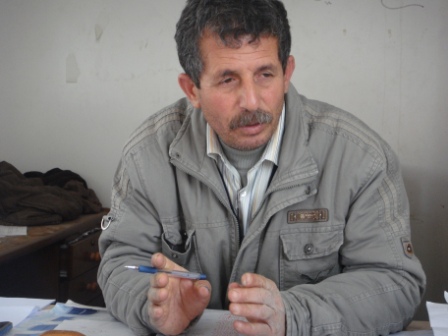
To help, the United Nations Relief and Works Agency (UNRWA), Mercy Corps and the French aid agency Acted (Agency for Technical Cooperation and Development) keep those unable to fish employed by paying them to mend damaged boats, clean up the coast line, etc.
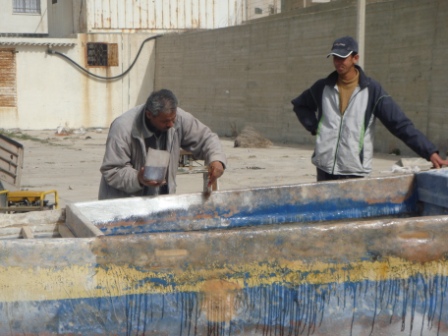
"We just have to be patient and act 'as one hand,'" says Hessey. That means, he said, political factions must work together, and individuals must resist the urge to respond to the hard life in Gaza by worrying about their own security. Times were hard during the first and second Intifada, but they got better, he said, and they will this time as well. "Twenty years ago, we were a strong community, especially fishermen. We have to be that way again and wait it out."